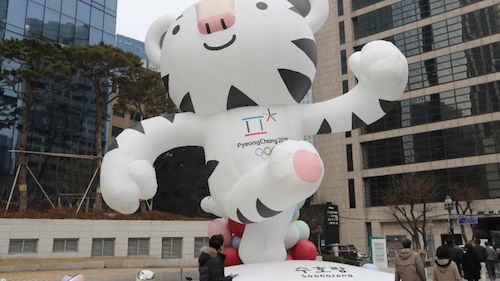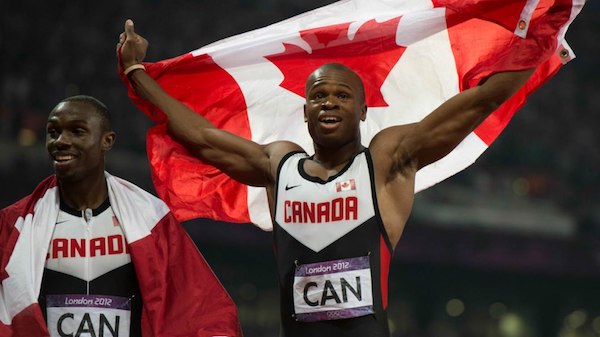

PyeongChang (TIP): One of the toughest things in sports is to be an Olympian. On an average, every four years only 5,000 to 7,000 sportsmen and women qualify to be Olympians and less than 1 per cent of them distinguish themselves and become Olympic medalists.
Naturally, it becomes much tougher to be both Winter and Summer Olympian. Though there are not many instances when athletes have competed in both summer and winter Olympic Games, yet few sportsmen and women, with their hard work and dedication, have scripted success stories in these mega sports events held within two years of each other.
Most recent case is of Kaillie Humphries and Phylicia George of Canada who won a bronze medal at PyeongChang.

Photo / courtesy TODAY
Who does not remember Tonga’s Pita Taufatofua who became a global sensation overnight when he arrived shirtless in freezing cold of the opening ceremony of the PyeongChang 2018 winter Olympic Games. He belongs to a select band of those athletes who have competed in successive summer and winter Olympic Games.
He competed in Taekwondo event in the 2016 summer Olympic Games in Rio and finished 114th in 15 km Cross-country skiing here.
It may be more than a dream for those who make it. It is the reality for a number of athletes from Canada who are competing here at PyeongChang. Two of them, Phylicia George and Seyi Smith, moved from track and field to Bobsleigh, an event that has also attracted some African athletes, including all-woman Nigerian team, to Winter Olympic Games.
“I started cross country skiing in 2017 and the training was perhaps the hardest I have ever done in my life,” Pita told media. “Races where we hope we could do well were getting cancelled and we had to book last minute one way ticket to the race where myself and German Madrazo of Mexico could finally qualify for PyeongChang 2018.”
Pita’s story is for those who after setting a target stay determined to achieve it.
“I was one of those people who thought I could sort of walk on and continue doing what I was doing before,” says Canadian track and field star Smith, who competed in the 4 x 100m relay at London 2012. “The overlap between track and bobsled is not as much as people think.”
Phylicia George, who competed in the 100m hurdles at London 2012 and Rio 2016, echoes Smith’s sentiment about bobsleigh being a whole lot more than just running fast on ice.
“The biggest thing was getting stronger, lifting a lot heavier,” says George. “I think I did not respect how much strength played a role and how much stronger I needed to get to be able to find the positions that I needed behind the sled.”

Beyond the need for physical strength, Smith and George also needed to dip into their reserves of psychological strength to overcome the inevitable obstacles of adapting to a whole new athletic discipline.
For Smith, though, there was never serious thought given to abandoning the quest.
“Everybody warned me when I first started out, saying, ‘You better watch out, Seyi, this is not track, there is not the glamour, you are going to be working in the cold and lifting sleds,’’” says Smith.
“It has been quite the opposite. Every month I have liked it more and more. I told one of the guys that the only time I actually said that I was having fun out loud is right before we crashed in training. So, I don’t say it out loud anymore. But inside, I am still enjoying myself quite a bit.”
George fared a bit differently, having competed at the Summer Games less than two years ago, and still being active in track and field. She says getting started in bobsleigh was “very rough” and she definitely second-guessed her decision.
But having been recruited to bobsleigh by Kaillie Humphries, the two-time reigning Olympic champion in the two-women event, it was perhaps inevitable that George’s competitive spirit would eventually win the day.
“There definitely were days when I was like, ‘man, what am I doing out here?’” says George. “But seeing myself get better and being a part of a team was a really cool and interesting aspect for me, where I’m used to being an individual. … I am really happy I stuck with it and saw my potential through.”

It is not a usual combination that would end on Olympic podium. While one had two Olympic medals to her belt, she gets a new partner who happens to be veteran of two summer Olympic Games, and the new combination ends with Olympic Bobsleigh bronze.
The pair is none other than mentor Kaillie Humphries and her new partner Phylicia George, otherwise Hurdler in Track and Field.
For Kaillie it has been her third straight Olympic bobsleigh medal.
With this medal, Canada has taken its tally to 21 with nine golds and is currently placed at overall number three position.
Humphries and George had been in fifth place after the first two runs, but were just four-one hundredths of a second out of a podium position. They made up that ground in their third run, moving into third place with a cumulative time of 2:32.12. That gave them a buffer of 0.05 on fourth-placed Americans Jamie Greubel Poser and Aja Evans.
In the final run, Humphries steered the sled down the track in 50.77 seconds for a four-run total time of 3:22.89, ensuring a podium finish with just the two leading tandems to go.
Humphries came to PyeongChang as the two-time reigning Olympic champion. She is now the first Canadian bobsledder to win three Olympic medals.
For George, it is her first Olympic medal and it comes in her Winter Olympic debut after she competed at two Summer Games in the 100m hurdles, making the final at both London 2012 and Rio 2016. She began bobsleigh training late last summer and competed in her first international race just this past November. She and Humphries won World Cup gold and silver together in January.
Slovenian Ice Hockey player tests positive for doping
As the PyeongChang 2018 Winter Olympic Games are inching towards a close, another case of violation of doping controls saw a Slovenia Ice Hockey player voluntarily accepting the charge and offered to quit the Olympic village.
The Anti-doping Division of the Court of Arbitration for Sport (CAS ADD) at the Pyeongchang 2018 Olympic Winter Games (OWG) announced that it has registered a new case.
Further to a request from the International Olympic Committee (IOC), and based upon the agreement of the parties, the CAS ADD has issued the following decision:
Zika Jeglic, Ice Hockey, Slovenia, tested positive in-competition test with fenoterol (beta-2 agonist; specified substance). He accepted an anti-doping rule violation. As a consequence, the athlete is suspended from competing in the remainder of the Olympic Winter Games Pyeongchang 2018; the athlete will leave the Olympic Village within 24 hours; the procedure will continue and the CAS ADD will issue a final award after the conclusion of the Games.
At the start of the second week of the Games, the Anti-doping Division of the Court of Arbitration for Sport, started procedure involving the athlete Aleksandr Krushelnitckii (mixed curling; OAR).
Though a date has been fixed for hearing, yet no further information is being provided at this point.
Earlier, a Japanese athlete also tested positive for doping and was suspended.
-Courtesy PTC News





Be the first to comment